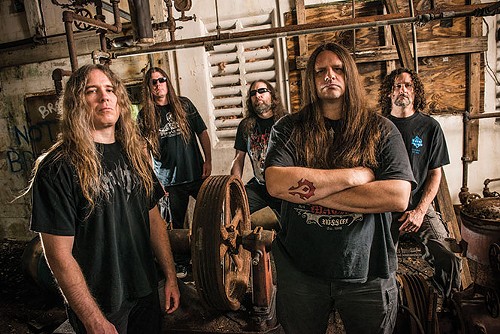This Side of Mainstream
Death metal's biggest band, Cannibal Corpse, on achieving acceptance.
By Marc HansonWhen Marilyn Manson surfaced in the mid-'90s to exploit teen angst and scare parents, heavy metal fans just yawned. Metalheads seek extremity in volume, speed and aesthetic—especially in death metal, one of the genre's most extreme divisions. Building on Metallica and Slayer's thrashy foundation, death metal cranked up the speed, distortion and musicianship—and took dark, disturbing lyrics and gruesome imagery to the next level. By the time Manson showed up, every taboo, sacrilege and depiction of violence had been explored within death metal, and Manson looked like what he is: Alice Cooper 2.0. Death metal bands like Cannibal Corpse stood back and smiled, saying, "That's cute, kid."
Formed in 1988 in Buffalo, N.Y., Cannibal Corpse were part of the first wave of American death metal that included bands like Death, Deicide, Obituary and Morbid Angel. The band's controversial lyrics, visceral album art and intense work ethic quickly brought them to the top of the underground metal scene, making them death metal's best-selling act. But, for a scene that holds a lot of pride in maintaining its underground status, one wonders if death metal's broadening mainstream appeal is a good thing.
"It just shows you that society is changing, not that death metal is changing," founding drummer Paul Mazurkiewicz says. "The way I look at it, the subject matter is just as brutal. As long as we feel we're not doing anything different in our way, like playing to the masses to become more popular ... I think it's a great thing."
From Day 1, Cannibal Corpse has proven their metal mettle, never compromising their sound. From the release of the first album, Eaten Back to Life (Metal Blade) in 1990, the band was routinely vilified by the Parents Music Resource Center (PMRC) in its crusade to promote sensible shoes and sanitized lyrics. Former U.S. Sen. Bob Dole, R-Kansas, even blamed the band, among others, for undermining national character. In response, Cannibal Corpse doubled down with album after album of vicious, precise death metal. The band is still going strong after 28 years, touring behind their 13th release, A Skeletal Domain (Metal Blade).
"Now, more than ever, heavy metal is more accepted in the mainstream," Mazurkiewicz says. "Society has had time to adapt. Generations have been subjected to [death metal], as opposed to when we started."
But has there ever been anything on a Cannibal Corpse album that they would rather their parents not see? "Pretty much all of it, man," Mazurkiewicz says. "It was strange, though, back in the early days. They just didn't understand, of course—at all. And they're not going to. They're your parents, and they're not into this kind of stuff, whatsoever."
It may surprise people that the members of Cannibal Corpse all enjoyed fairly decent upbringings. "Our parents know how we are as people, [so] I was never worried [that they'd judge me]," Mazurkiewicz says. They didn't exactly embrace their son's buzzsaw-ing songs about blood 'n' guts, but they came around. "My dad, now, is a big fan. He goes to the shows and listens to the albums."
Mom isn't quite as far along: "I don't think my mom has ever read anything we've written, and I would never say, 'Here, Mom—here's my new CD,'" he says.
Many of the band members now have children of their own, which brings a different sort of challenge: How does one explain to their kids that their career is built on music that graphically describes heinous things like rape, murder, cannibalism and mutilation?
Mazurkiewicz concedes, "It's going to be a tough one." With his 10-year-old daughter, he approaches the subject with age-appropriate information. She doesn't need to know the gory details, but she's growing up in a much different world than existed 28 years ago, when Cannibal Corpse was born. "I think [kids] know what's going on around them; they know of bad things," he says. "It's not like the '50s, where everything's perfect. Now, everyone is talking about zombies and things. I just want her to understand that what I do is just entertainment."
Cannibal Corpse is part of a certain entertainment niche, where death-metal bands and their fans can explore the darker nature of humanity and safely indulge in their own morbid curiosity. And if one is brave enough to go a little deeper, they will find that under all the blood and guts is some of the most serious, technically demanding music this side of jazz/fusion. The energy is so powerful it puts the listener in the moment. In an odd way, death metal is healing music.
"Music itself is a powerful thing," Mazurkiewicz says. "If we can be of any service like that, where people can feel solace [in our music], or we can help people through hard times ... That's a good feeling, and we're happy to be a part of that."
More by Marc Hanson
-
Live: Music Picks May 5-11
- May 4, 2016
-
Live: Music Picks Apr. 28-May 4
We're talkin' about Salsa Brava, Mambo Jumbo, Ritmo Caliente and Orquesta Latinos
- Apr 27, 2016
-
Orgone
L.A. funk/soul/groove merchants Orgone emerge from the cosmic energy of decades past
- Jun 24, 2015
- More »
Latest in Music
Readers also liked…
-
The Alpines Head North
Local band's debut concept album finds musical bliss in the apocalypse.
- Feb 7, 2024



